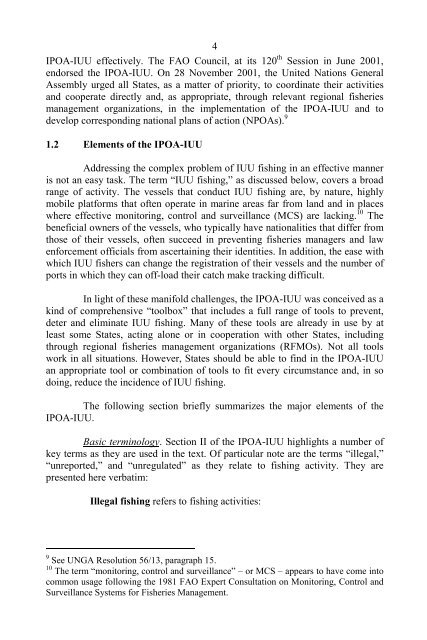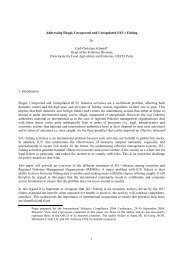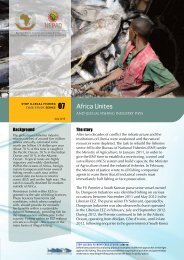3Since the late 1990s, a number <strong>of</strong> international fora have issued calls tocombat <strong>IUU</strong> fishing. 6 The FAO Committee on Fisheries (COFI), at its TwentythirdSession in 1999, considered the problem to be a matter <strong>of</strong> high priority.Information presented to COFI at that time indicated that <strong>IUU</strong> fishing,particularly by fishing vessels flying “flags <strong>of</strong> convenience,” was a growingthreat to the achievement <strong>of</strong> sustainable fisheries. In the face <strong>of</strong> such information,COFI recommended the elaboration <strong>of</strong> an <strong>International</strong> Plan <strong>of</strong> Action toPrevent, Deter and Eliminate Illegal, Unreported and Unregulated Fishing(<strong>IPOA</strong>-<strong>IUU</strong>). 7Shortly afterwards, an FAO Ministerial Meeting on Fisheries in March1999 expressed concern over the growing incidence <strong>of</strong> <strong>IUU</strong> fishing and declaredthat, without prejudice to the rights and obligations <strong>of</strong> States under internationallaw, FAO “will develop a global plan <strong>of</strong> action to deal effectively with all forms<strong>of</strong> illegal, unregulated and unreported fishing, including fishing by vessels flying‘flags <strong>of</strong> convenience,’ through coordinated efforts by States, FAO, relevantregional fisheries management bodies and other relevant international agenciessuch as the <strong>International</strong> Maritime Organization (IMO).”In June 1999, the FAO Council echoed these calls for a comprehensiveinitiative to tackle the problem <strong>of</strong> <strong>IUU</strong> fishing and determined that this initiativeshould be carried forward through the development <strong>of</strong> an international plan <strong>of</strong>action within the framework <strong>of</strong> the Code <strong>of</strong> Conduct.The Government <strong>of</strong> Australia, in cooperation with FAO, organized anExpert Consultation on Illegal, Unreported and Unregulated Fishing, which tookplace in Sydney, Australia, from 15 to 19 May 2000. 8 FAO subsequentlyconvened a Technical Consultation on Illegal, Unreported and UnregulatedFishing in Rome from 2 to 6 October 2000. During a further TechnicalConsultation, held in Rome from 22 to 23 February 2001, careful deliberationsproduced a complete text for the draft <strong>IPOA</strong> for consideration by COFI at itsTwenty-fourth Session.COFI adopted the <strong>IPOA</strong>-<strong>IUU</strong>, by consensus, on 2 March 2001. In doingso, COFI urged all FAO Members to take the necessary steps to implement the6 E.g. the Commission on Sustainable Development (April 1999); the Asia-PacificEconomic Cooperation Fisheries Working Group (July 1999); the United Nations GeneralAssembly (November 1999); the IMO Sub-Committee on Flag State <strong>Implementation</strong>(January 2000); the IMO Marine Environment Protection Committee (March 2000); theUnited Nations Open-ended Informal Consultative Process on Oceans and the Law <strong>of</strong> theSea (May 2000).7 Report <strong>of</strong> the Twenty-third Session <strong>of</strong> the Committee on Fisheries, Rome, Italy, 15-19February 1999, Paragraph 72.8 Documents relating to this Expert Consultation are available in the Report <strong>of</strong> the ExpertConsultation on Illegal, Unreported and Unregulated Fishing.
4<strong>IPOA</strong>-<strong>IUU</strong> effectively. The FAO Council, at its 120 th Session in June 2001,endorsed the <strong>IPOA</strong>-<strong>IUU</strong>. On 28 November 2001, the United Nations GeneralAssembly urged all States, as a matter <strong>of</strong> priority, to coordinate their activitiesand cooperate directly and, as appropriate, through relevant regional fisheriesmanagement organizations, in the implementation <strong>of</strong> the <strong>IPOA</strong>-<strong>IUU</strong> and todevelop corresponding national plans <strong>of</strong> action (NPOAs). 91.2 Elements <strong>of</strong> the <strong>IPOA</strong>-<strong>IUU</strong>Addressing the complex problem <strong>of</strong> <strong>IUU</strong> fishing in an effective manneris not an easy task. The term “<strong>IUU</strong> fishing,” as discussed below, covers a broadrange <strong>of</strong> activity. The vessels that conduct <strong>IUU</strong> fishing are, by nature, highlymobile platforms that <strong>of</strong>ten operate in marine areas far from land and in placeswhere effective monitoring, control and surveillance (<strong>MCS</strong>) are lacking. 10 Thebeneficial owners <strong>of</strong> the vessels, who typically have nationalities that differ fromthose <strong>of</strong> their vessels, <strong>of</strong>ten succeed in preventing fisheries managers and lawenforcement <strong>of</strong>ficials from ascertaining their identities. In addition, the ease withwhich <strong>IUU</strong> fishers can change the registration <strong>of</strong> their vessels and the number <strong>of</strong>ports in which they can <strong>of</strong>f-load their catch make tracking difficult.In light <strong>of</strong> these manifold challenges, the <strong>IPOA</strong>-<strong>IUU</strong> was conceived as akind <strong>of</strong> comprehensive “toolbox” that includes a full range <strong>of</strong> tools to prevent,deter and eliminate <strong>IUU</strong> fishing. Many <strong>of</strong> these tools are already in use by atleast some States, acting alone or in cooperation with other States, includingthrough regional fisheries management organizations (RFMOs). Not all toolswork in all situations. However, States should be able to find in the <strong>IPOA</strong>-<strong>IUU</strong>an appropriate tool or combination <strong>of</strong> tools to fit every circumstance and, in sodoing, reduce the incidence <strong>of</strong> <strong>IUU</strong> fishing.The following section briefly summarizes the major elements <strong>of</strong> the<strong>IPOA</strong>-<strong>IUU</strong>.Basic terminology. Section II <strong>of</strong> the <strong>IPOA</strong>-<strong>IUU</strong> highlights a number <strong>of</strong>key terms as they are used in the text. Of particular note are the terms “illegal,”“unreported,” and “unregulated” as they relate to fishing activity. They arepresented here verbatim:Illegal fishing refers to fishing activities:9 See UNGA Resolution 56/13, paragraph 15.10 The term “monitoring, control and surveillance” – or <strong>MCS</strong> – appears to have come intocommon usage following the 1981 FAO Expert Consultation on Monitoring, Control andSurveillance Systems for Fisheries Management.
- Page 4 and 5: iiiPREPARATION OF THIS DOCUMENTThe
- Page 6 and 7: vThe IPOA-IUU is voluntary. However
- Page 8 and 9: viii6.2 Examples of some port State
- Page 10 and 11: xiBACKGROUND1. From ancient times,
- Page 12 and 13: xiii11. The Code is voluntary. Howe
- Page 14 and 15: 1. INTERNATIONAL PLAN OF ACTION - I
- Page 18 and 19: 5(1) conducted by national or forei
- Page 20 and 21: 7flag States, coastal States and Po
- Page 22 and 23: 9In light of this, the very first
- Page 24 and 25: 11the vessels rarely if ever visit
- Page 26 and 27: 13For example, Japan requires its n
- Page 28 and 29: 15IUU fishing on the high seas. 27
- Page 30 and 31: 17end all forms of government econo
- Page 32 and 33: 19developing States, 36 have introd
- Page 34 and 35: 21If the vessel is fishing on the h
- Page 36 and 37: 23registering a vessel that has a h
- Page 38 and 39: 25RFMOs have a role to play in ensu
- Page 40 and 41: 27FAO, in turn, will make available
- Page 42 and 43: 29species can be caught, what gear
- Page 44 and 45: 31Flag States are also encouraged t
- Page 46 and 47: 33cases, fishing vessels registered
- Page 48: 35light of this, paragraph 51 of th
- Page 51 and 52: 38transshipment at sea is prohibite
- Page 53 and 54: 40supported IUU fishing. For exampl
- Page 55 and 56: 42Japan prohibits port calls by tun
- Page 57 and 58: 44of a NAFO member, it must be insp
- Page 59 and 60: 46discussed in Section 7 of these g
- Page 61 and 62: 48products harvested through IUU fi
- Page 63 and 64: 50products. On the basis of that da
- Page 65 and 66: 52question, while the latter only c
- Page 67 and 68:
54States can also combat IUU fishin
- Page 69 and 70:
56RFMOs engage in IUU fishing. No s
- Page 71 and 72:
588.3 Possibilities for Further Act
- Page 73 and 74:
60resolutions calling on those memb
- Page 75 and 76:
62landings, port control, and inspe
- Page 77 and 78:
648.3.8 Actions in Response to Rema
- Page 79 and 80:
66As a result, IUU fishers often co
- Page 81 and 82:
68A number of other developed State
- Page 83 and 84:
702.4 Measures to control transport
- Page 85 and 86:
10.3 Suggested Format for Reports t
- Page 87 and 88:
74Flag States should closely contro
- Page 89 and 90:
76A coastal State should consider r
- Page 91 and 92:
78To assist States in implementing
- Page 93 and 94:
12. LITERATURE CITED80Agnew, D.J. 2
- Page 95 and 96:
82Greenpeace. 2001. Pirate Fishing:
- Page 97 and 98:
84II. NATURE AND SCOPE OF IUU FISHI
- Page 99 and 100:
86to the Conservation and Managemen
- Page 101 and 102:
National Legislation88Legislation16
- Page 103 and 104:
90National Plans of Action25. State
- Page 105 and 106:
9236.2 having taken into account al
- Page 107 and 108:
9446.3 the species, fishing gear au
- Page 109 and 110:
9651.2 cooperation and exchange of
- Page 111 and 112:
98general operating guidelines for
- Page 113 and 114:
100and should consider measures to
- Page 115 and 116:
10280.9 development of observer pro
- Page 117 and 118:
10486.3 the strengthening of region
- Page 119 and 120:
106Articles V, VI, and VII of the A
- Page 121 and 122:
1084.2 To the greatest extent pract
- Page 123 and 124:
110• Compliance with other aspect
- Page 125 and 126:
1126. Information regarding such si
- Page 127 and 128:
114Annex ACommon English Name Scien
- Page 129 and 130:
1164. Parties shall consider and ac
- Page 131 and 132:
118Committed to take steps, consist
- Page 133 and 134:
1209. An export-validated Dissostic
- Page 135:
122APPENDIX VIWEBSITES OF SELECTED
















